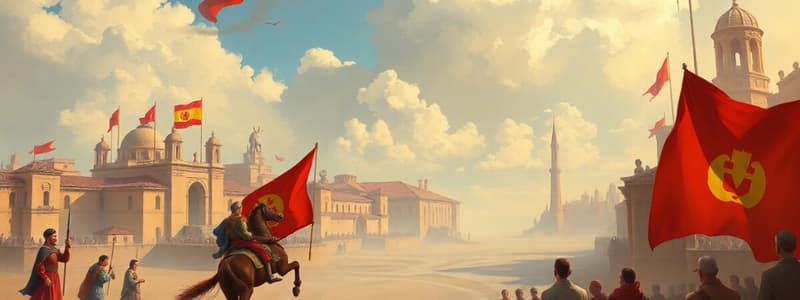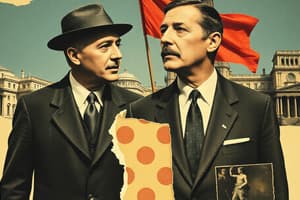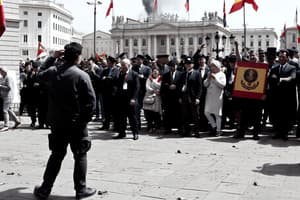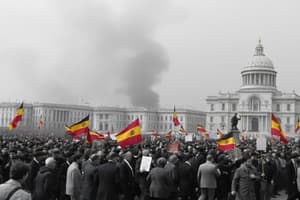Podcast
Questions and Answers
¿Cuál de las siguientes etapas marcó el reinado de Alfonso XIII?
¿Cuál de las siguientes etapas marcó el reinado de Alfonso XIII?
- Los Gobiernos de concentración (1917-1923) (correct)
- Todas las anteriores (correct)
- La dictadura de Berenguer (1930-1931) (correct)
- La dictadura de Primo de Rivera (1923-1930) (correct)
- El bipartidismo (1902-1917) (correct)
La Segunda República Española se proclamó el 14 de abril de 1931.
La Segunda República Española se proclamó el 14 de abril de 1931.
True (A)
¿Qué factores contribuyeron a la inestabilidad política durante el reinado de Alfonso XIII?
¿Qué factores contribuyeron a la inestabilidad política durante el reinado de Alfonso XIII?
La intervención del monarca y del ejército en la vida política, las campañas de Marruecos y el descontento de diversos grupos sociales.
El general Miguel Primo de Rivera dio un golpe de estado en ______ iniciando una dictadura de corte fascista.
El general Miguel Primo de Rivera dio un golpe de estado en ______ iniciando una dictadura de corte fascista.
Empareja cada periodo con el gobernante o figura clave:
Empareja cada periodo con el gobernante o figura clave:
¿Qué eventos históricos marcaron la primera mitad del siglo XX en España?
¿Qué eventos históricos marcaron la primera mitad del siglo XX en España?
El golpe de estado de Primo de Rivera fue un evento que impulsó la democracia en España.
El golpe de estado de Primo de Rivera fue un evento que impulsó la democracia en España.
¿Qué eventos motivó el golpe de estado de Primo de Rivera?
¿Qué eventos motivó el golpe de estado de Primo de Rivera?
La segunda república española fue proclamada el ______ de ______ de ______.
La segunda república española fue proclamada el ______ de ______ de ______.
La dictadura de Primo de Rivera fue un periodo de estabilidad política y social en España.
La dictadura de Primo de Rivera fue un periodo de estabilidad política y social en España.
Flashcards
Conflictos políticos en España
Conflictos políticos en España
Conflictos entre conservadores y liberales durante el siglo XX.
Regencia de María Cristina
Regencia de María Cristina
Período de gobierno interino de María Cristina tras la muerte de Alfonso XII.
Reinado de Alfonso XIII
Reinado de Alfonso XIII
Alfonso XIII fue rey de 1902 a 1931, con varias etapas políticas.
Período de bipartidismo
Período de bipartidismo
Signup and view all the flashcards
Gobiernos de concentración
Gobiernos de concentración
Signup and view all the flashcards
Dictadura de Primo de Rivera
Dictadura de Primo de Rivera
Signup and view all the flashcards
Dictablanda de Berenguer
Dictablanda de Berenguer
Signup and view all the flashcards
Segunda República Española
Segunda República Española
Signup and view all the flashcards
Guerra Civil Española
Guerra Civil Española
Signup and view all the flashcards
Dictadura franquista
Dictadura franquista
Signup and view all the flashcards
Study Notes
Spanish History: First Half of the 20th Century
- Political Conflicts: The first half of the 20th century in Spain saw continuous conflict between conservatives and liberals, including the reign of Alfonso XIII, the dictatorship of Primo de Rivera, the Second Republic, the Spanish Civil War, and the subsequent Franco dictatorship. This period was particularly tumultuous.
Reign of Alfonso XIII
- Majority of Age: Alfonso XIII (1902-1931) reached his majority in 1902, at age 16, and swore an oath to the Constitution.
- Early Reign: His reign marked the first part of the 20th century in Spain.
- Four Distinct Periods: His reign encompassed four distinct periods:
- Bi-Partisan Period (1902-1917): Conservative and liberal parties exchanged power, but were hampered by the monarchy and military in politics. Political instability was heightened by the Moroccan campaigns (1909-1927) and worker protests.
- Concentration Governments (1917-1923): This period followed a crisis resolved by military intervention and a shift towards coalition governments. It represented the end of the bi-partisan system. There were 13 changes in government in four years.
- Primo de Rivera Dictatorship (1923-1930): General Miguel Primo de Rivera overthrew the government with a fascist-leaning dictatorship supported by the business community and conservative groups. His action was motivated by the army's perceived responsibility for a military defeat at Annual (1921), and the political instability of the time.
- Berenguer's "Soft Dictatorship" (1930-1931): Primo de Rivera's resignation was followed by the appointment of General Berenguer, who ultimately failed to restore stability to the country, leading to further turmoil.
The Spanish Republic (1931-1939)
- Establishment: The Second Republic was established in 1931 following the abdication and exile of Alfonso XIII.
- Social and Political Reforms: The Republic aimed at modernizing Spanish society and addressing issues like cultural and scientific underdevelopment, military issues, relations with the Church, land reforms, and the establishment of a democratic state.
Studying That Suits You
Use AI to generate personalized quizzes and flashcards to suit your learning preferences.




